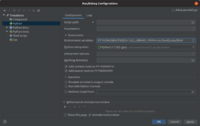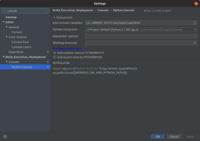CUDA: Difference between revisions
Appearance
| Line 28: | Line 28: | ||
* For machine learning, use Anaconda or Docker's CUDA since different versions of TensorFlow and PyTorch require different CUDA versions. | * For machine learning, use Anaconda or Docker's CUDA since different versions of TensorFlow and PyTorch require different CUDA versions. | ||
You may need to add <code>LD_LIBRARY_PATH | You may need to add <code>LD_LIBRARY_PATH=/usr/local/cuda/lib64</code> to your environment variables.<br> | ||
You can also do this in PyCharm.<br> | You can also do this in PyCharm.<br> | ||
[[File:Pycharm LD LIBRARY PATH config.png| 200x200px]] | [[File:Pycharm LD LIBRARY PATH config.png| 200x200px]] | ||
Revision as of 21:20, 6 July 2022
Installation
Ubuntu
Details
# Set UBUNTU_VERSION to 2004 or 2204
UBUNTU_VERSION=$(lsb_release -sr | sed -e 's/\.//g')
# Add NVIDIA package repositories
wget https://developer.download.nvidia.com/compute/cuda/repos/ubuntu${UBUNTU_VERSION}/x86_64/cuda-ubuntu${UBUNTU_VERSION}.pin
sudo mv cuda-ubuntu${UBUNTU_VERSION}.pin /etc/apt/preferences.d/cuda-repository-pin-600
sudo apt-key adv --fetch-keys https://developer.download.nvidia.com/compute/cuda/repos/ubuntu${UBUNTU_VERSION}/x86_64/3bf863cc.pub
sudo add-apt-repository "deb https://developer.download.nvidia.com/compute/cuda/repos/ubuntu${UBUNTU_VERSION}/x86_64/ /"
# Install NVIDIA driver and cuda.
sudo apt install nvidia-driver-515 cuda
# Reboot and check that the drivers are working with nvidia-smi
sudo reboot
# Install cudnn
sudo apt install libcudnn8 libcudnn8-dev
- Notes
- For machine learning, use Anaconda or Docker's CUDA since different versions of TensorFlow and PyTorch require different CUDA versions.
You may need to add LD_LIBRARY_PATH=/usr/local/cuda/lib64 to your environment variables.
You can also do this in PyCharm.


GCC Versions
nvcc sometimes only supports older gcc/g++ versions.
To make it use those by default, create the following symlinks:
sudo ln -s /usr/bin/gcc-6 /usr/local/cuda/bin/gccsudo ln -s /usr/bin/g++-6 /usr/local/cuda/bin/g++
Alternatively, you can use -ccbin and point to your gcc:
-ccbin /usr/local/cuda/bin/gcc
